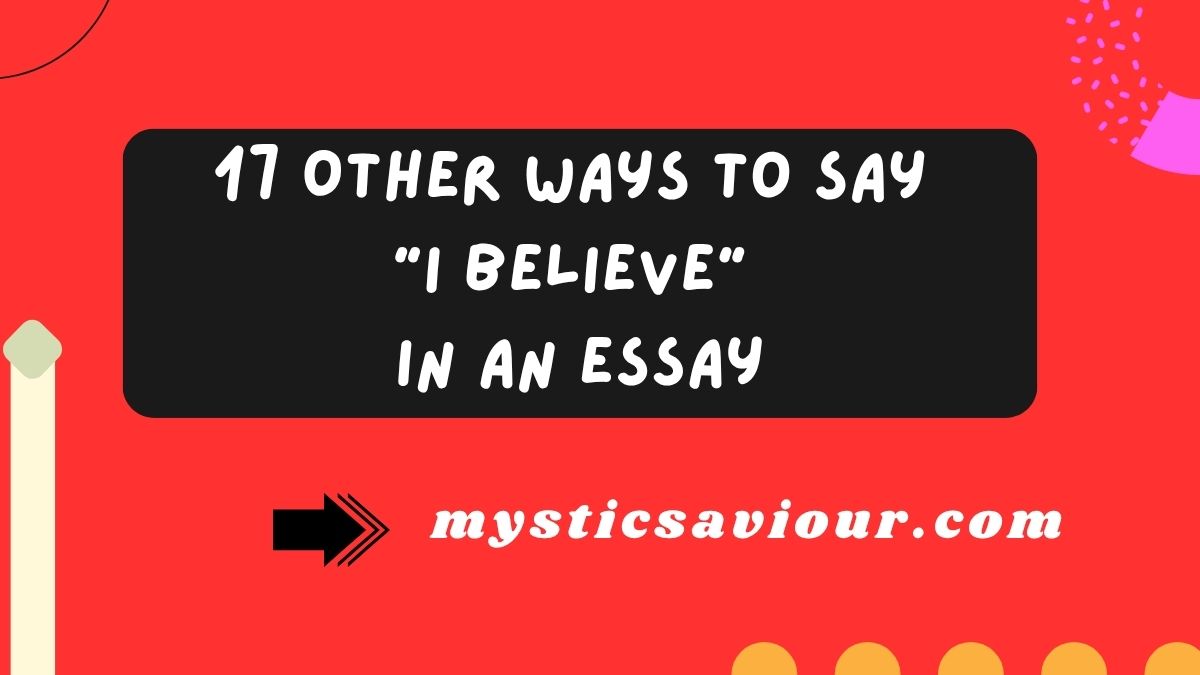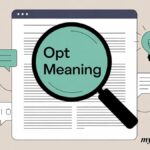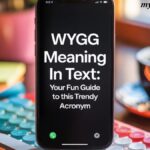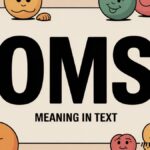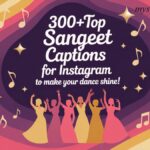“17 Other Ways to Say ‘I Believe’ in an Essay” refers to a curated collection of alternative expressions that writers can use to present personal viewpoints in a more formal, objective, and academic tone. These phrases are especially useful in scholarly writing, where clarity, neutrality, and credibility are vital. Instead of directly using “I believe,” which can sound informal or subjective, these alternatives help articulate opinions in a sophisticated and professional manner.
In academic writing, the right choice of words can shape the reader’s perception and enhance the overall impact of your argument. Swapping simple phrases like “I believe” with powerful and polished alternatives immediately elevates the quality of your essay. It shows maturity in thought and expression—exactly what professors and scholarly readers expect from well-written work.
This guide on “17 Other Ways to Say ‘I Believe’ in an Essay” offers you smart, strategic language choices that improve your tone and presentation. Whether you’re writing a persuasive essay or analytical paper, these alternatives will help you express personal beliefs more convincingly while maintaining academic integrity.
Why “I Believe” Falls Short in Academic Writing
The Personal Problem
“I believe” sounds too personal for most academic contexts. Universities train students to adopt an objective tone because scholarly work should stand on evidence, not personal feelings.
Consider this weak example:
“I believe climate change causes extreme weather.”
Now compare it to this stronger version:
“Research indicates climate change intensifies extreme weather patterns.”
The second version carries weight. It suggests you’ve done your homework rather than sharing a gut feeling.
Precision Matters
Different situations call for different levels of certainty. “I believe” is vague—it could mean anything from “I have a hunch” to “I’m certain based on extensive research.”
Academic vocabulary gives you precision tools:
- Tentative conclusions: “It appears that…”
- Strong evidence: “Data demonstrates…”
- Moderate confidence: “Findings suggest…”
Reader Engagement Issues
Repetitive language kills engagement faster than you’d think. When readers see the same phrase repeatedly, their brains essentially skip over it. Your brilliant insights get lost in monotonous phrasing.
Essay language improvement starts with recognizing this pattern and breaking it intentionally.
The 17 Superior Alternatives: Your Complete Toolkit
Evidence-Based Alternatives
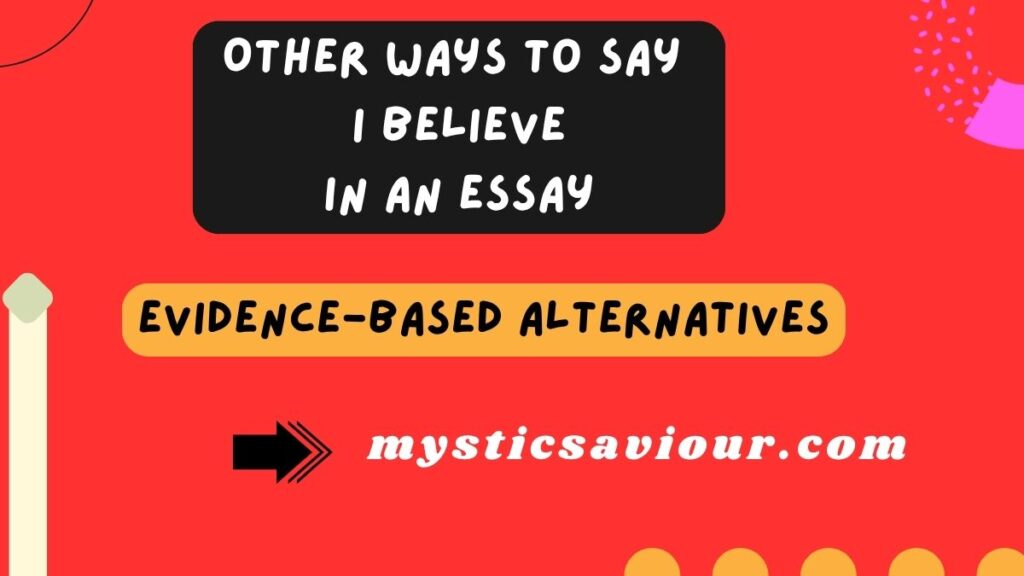
These phrases work best when you have solid data backing your claims. They signal to readers that you’re not just sharing opinions—you’re presenting evidence-based arguments.
“Research indicates”
This powerhouse phrase works perfectly for empirical reasoning. Use it when citing studies or presenting findings from multiple sources.
Example in action:
“Research indicates that students who get adequate sleep score 15% higher on standardized tests than their sleep-deprived peers.”
Best contexts:
- Psychology papers
- Education research
- Health studies
- Social science analyses
“Evidence supports”
When you want to show strong backing for your position, this phrase delivers. It’s more definitive than “suggests” but not as absolute as “proves.”
Example in action:
“Evidence supports the hypothesis that diverse teams outperform homogeneous groups in creative problem-solving tasks.”
Perfect for:
- Scientific discussions
- Business case studies
- Policy arguments
- Literature reviews
“Studies demonstrate”
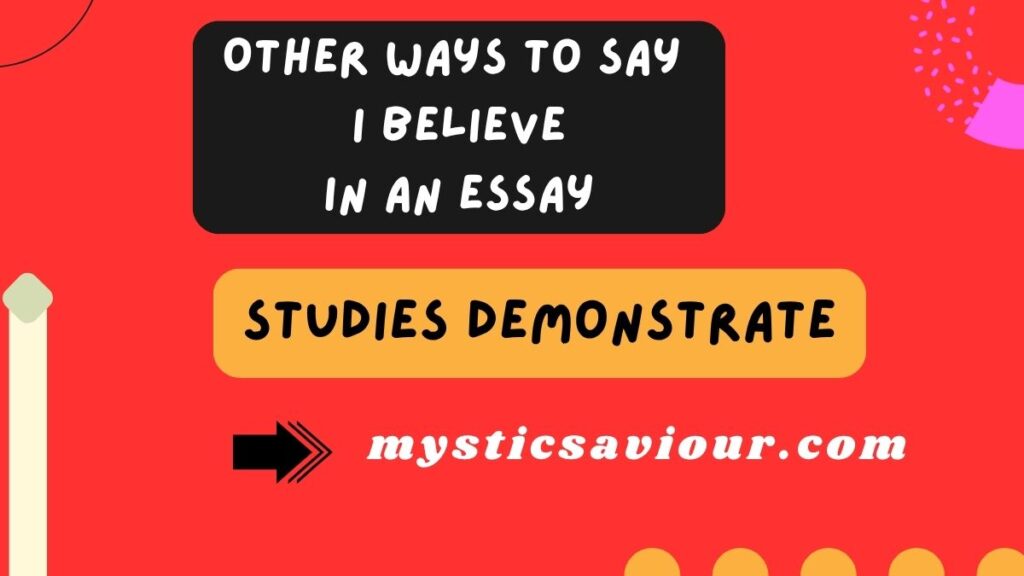
This phrase carries serious academic weight. Use it when you have multiple studies pointing toward the same conclusion.
Example in action:
“Multiple studies demonstrate that meditation reduces cortisol levels by an average of 23% within six weeks.”
Ideal contexts:
- Medical research papers
- Psychology essays
- Behavioral studies
- Therapeutic interventions
“The data shows”
Direct and powerful, this phrase works when you have specific numbers or statistics to present.
Example in action:
“Census data shows that urban migration increased by 40% between 2010 and 2020.”
Best applications:
- Economics papers
- Demographics studies
- Market analysis
- Statistical reports
“Findings indicate”
This phrase suggests careful analysis without overstating certainty. It’s perfect for interpretative stance situations where results point toward conclusions.
Example in action:
“Laboratory findings indicate a correlation between vitamin D deficiency and seasonal depression.”
Optimal use:
- Research summaries
- Experimental results
- Clinical studies
- Observational research
Analytical Alternatives
These phrases show you’ve engaged in critical thinking in essays. They demonstrate analytical skills and a deeper examination of topics.
“Analysis reveals”
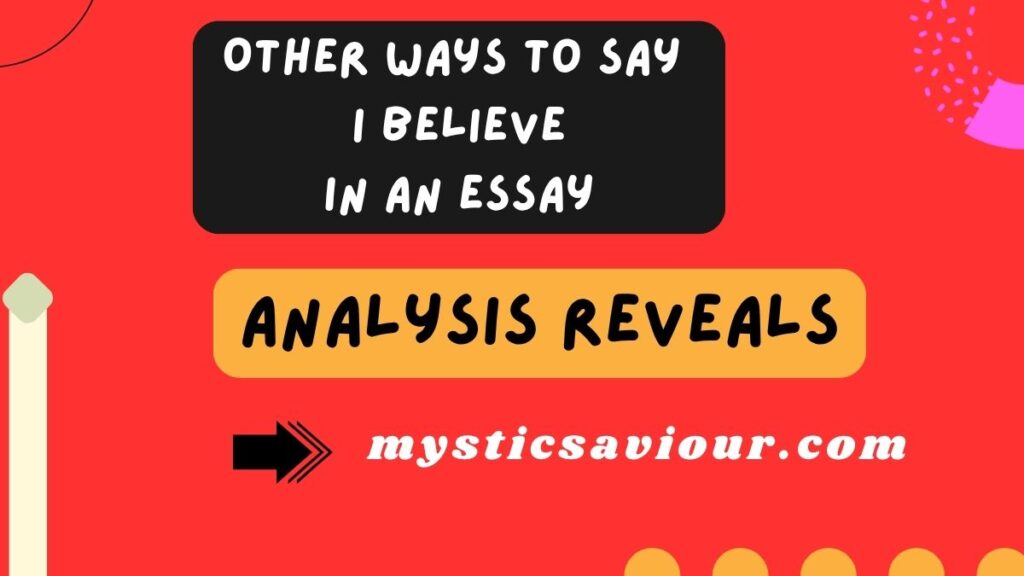
This phrase signals a thorough examination. It works when you’ve broken down complex information into understandable components.
Example in action:
“Market analysis reveals consumer spending patterns shift dramatically during economic uncertainty.”
Perfect contexts:
- Business analysis
- Economic papers
- Strategic planning
- Competitive assessments
“Examination reveals”
Slightly more formal than “analysis,” this phrase suggests a comprehensive investigation.
Example in action:
“Historical examination reveals recurring patterns in technological adoption cycles.”
Best applications:
- Historical analysis
- Literature reviews
- Comprehensive studies
- Systematic investigations
“Investigation suggests”
This phrase works when you’ve conducted a thorough inquiry but want to maintain appropriate uncertainty.
Example in action:
“Police investigation suggests multiple factors contributed to the accident.”
Ideal for:
- Criminal justice papers
- Journalistic writing
- Case study analysis
- Exploratory research
“Assessment indicates”
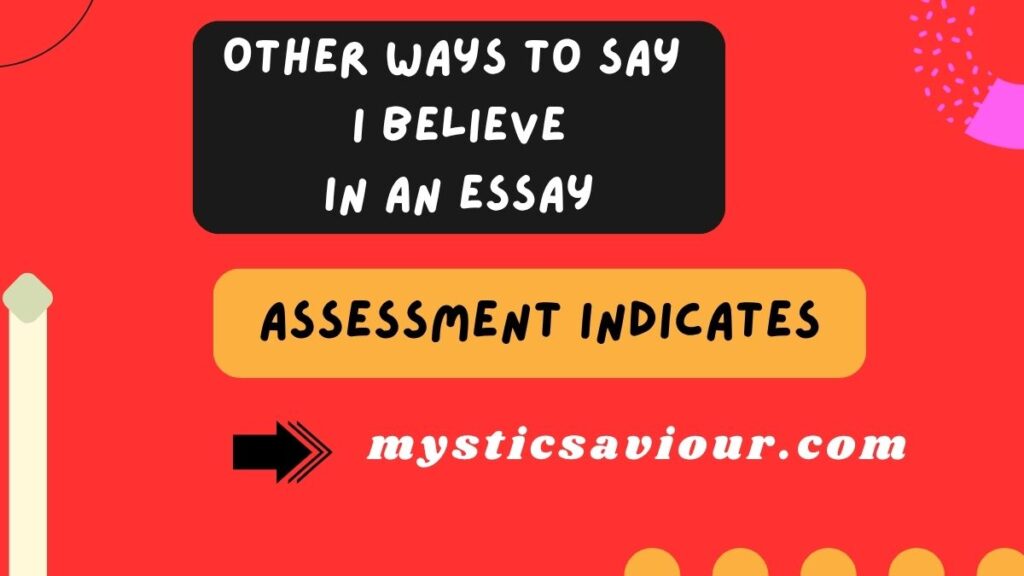
Perfect for evaluation-based conclusions where you’ve measured or judged something against criteria.
Example in action:
“Environmental assessment indicates significant ecosystem recovery following conservation efforts.”
Optimal contexts:
- Environmental studies
- Program evaluations
- Risk analysis
- Performance reviews
“Evaluation demonstrates”
This phrase carries weight when you’ve systematically judged something against established standards.
Example in action:
“Program evaluation demonstrates 30% improvement in student reading comprehension.”
Best uses:
- Educational assessments
- Policy analysis
- Program reviews
- Effectiveness studies
Observation-Based Alternatives
These phrases work when your conclusions come from direct observation or pattern recognition. They’re excellent for neutral academic language that maintains objectivity vs subjectivity.
“Observations point to”
This phrase suggests careful watching and noting of phenomena. It maintains scientific objectivity while drawing conclusions.
Example in action:
“Field observations point to declining pollinator populations in agricultural areas.”
Perfect for:
- Scientific field studies
- Behavioral research
- Natural phenomena
- Ethnographic studies
“Patterns indicate”
Use this when you’ve identified recurring themes or trends across data sets or time periods.
Example in action:
“Voting patterns indicate increasing political polarization among different age groups.”
Ideal contexts:
- Political science
- Sociological studies
- Trend analysis
- Behavioral patterns
“Trends show”
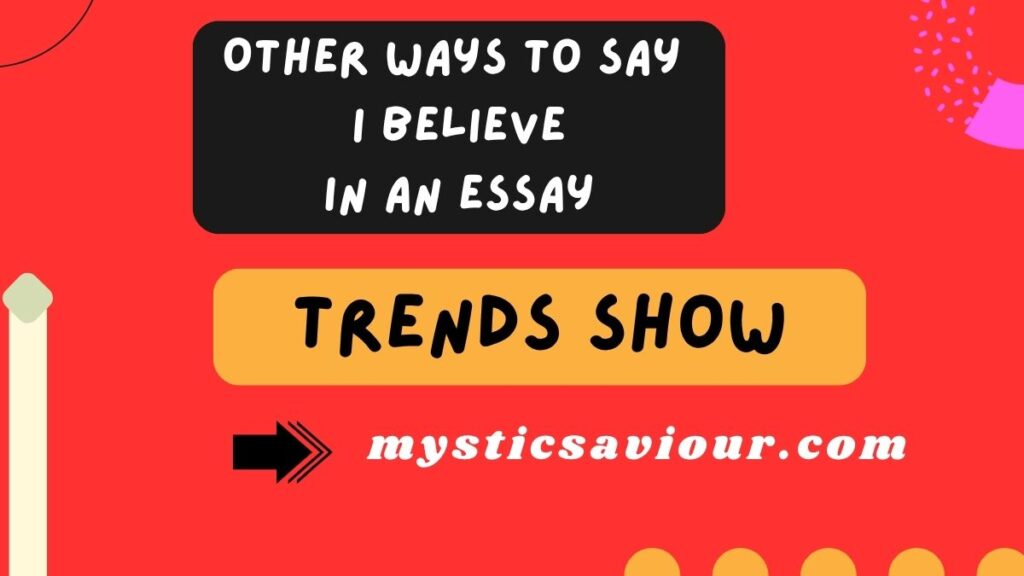
Direct and clear, this phrase works when discussing directional changes over time.
Example in action:
“Employment trends show growing demand for cybersecurity professionals.”
Best applications:
- Economic forecasting
- Career guidance
- Market predictions
- Social changes
Perspective-Based Alternatives
These phrases help you present alternative expressions in writing while maintaining academic credibility. They’re perfect for addressing different viewpoints.
“One might argue”
This sophisticated phrase introduces perspectives without personal attachment. It’s excellent for third-person narrative approaches.
Example in action:
“One might argue that social media platforms bear responsibility for user mental health outcomes.”
Perfect contexts:
- Controversial topics
- Balanced arguments
- Multiple perspectives
- Philosophical discussions
“It appears that”
This phrase suggests tentative conclusions based on available information. It maintains appropriate uncertainty.
Example in action:
“It appears that remote work arrangements will become permanent for many organizations.”
Best uses:
- Emerging trends
- Preliminary findings
- Future predictions
- Uncertain outcomes
“This suggests”
Perfect for drawing connections between different pieces of information or making logical inferences.
Example in action:
“This suggests a direct relationship between education funding and student achievement.”
Ideal for:
- Cause-effect relationships
- Logical connections
- Inference drawing
- Hypothesis formation
“The implication is”
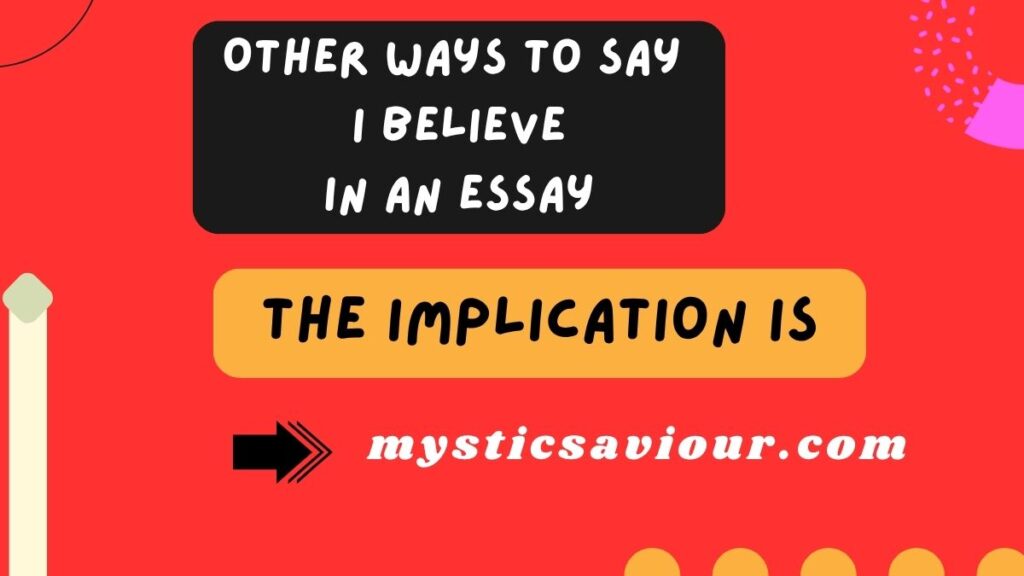
Use this phrase when you want to highlight the significance or consequences of findings.
Example in action:
“The implication is that current healthcare policies require immediate revision.”
Optimal contexts:
- Policy recommendations
- Strategic conclusions
- Future planning
- Consequence discussions
Context Matters: Choosing the Right Alternative
Scientific Papers Demand Precision
Formal writing expressions in scientific contexts require specific language choices. When writing for scientific audiences, prioritize evidence-based arguments:
| Context | Best Phrases | Avoid |
|---|---|---|
| Lab results | “Data demonstrates,” “Findings indicate” | “I think,” “It seems” |
| Literature reviews | “Research shows,” “Studies reveal” | “Obviously,” “Clearly” |
| Hypothesis testing | “Evidence supports,” “Results suggest” | “I believe,” “In my opinion” |
Literary Analysis Needs Interpretation
Scholarly engagement in literature requires different tools. You’re interpreting texts, not presenting hard data:
Strong choices:
- “Analysis reveals”
- “Examination suggests”
- “This indicates”
Weaker options:
- “I feel”
- “It’s obvious.”
- “Everyone knows”
Opinion Pieces Allow More Flexibility
Even in academic discourse practices, opinion pieces permit more personal language, but strategic variety still strengthens your writing sophistication.
Mix these approaches:
- Evidence-based: “Research supports…”
- Analytical: “Examination shows…”
- Perspective-based: “One might argue…”
Common Mistakes That Undermine Academic Credibility
Overusing Academic Jargon
Stylistic enhancement doesn’t mean drowning readers in unnecessarily complex language. Balance sophistication with clarity.
Too much jargon:
“Empirical investigations substantiate the theoretical framework’s pedagogical efficacy.”
Better balance:
“Research indicates this teaching method improves student learning outcomes.”
Mixing Formal and Informal Tones
Academic tone in writing requires consistency. Don’t jump between casual and formal language within the same piece.
Inconsistent example:
“Studies demonstrate significant climate impacts, but honestly, things look pretty bad.”
Consistent version:
“Studies demonstrate significant climate impacts, suggesting urgent intervention is necessary.”
Choosing Wrong Certainty Levels
Match your phrase strength to your evidence quality. Don’t overstate weak evidence or understate strong findings.
| Evidence Strength | Appropriate Phrases | Inappropriate Phrases |
|---|---|---|
| Strong, multiple studies | “Research demonstrates” | “It might suggest” |
| Single study | “Evidence indicates” | “This proves conclusively” |
| Preliminary data | “Initial findings suggest” | “Data clearly shows” |
Forgetting Your Audience
Persuasive writing tools work differently for different readers. Consider who you’re addressing:
For professors: Emphasize evidence and analysis. For peers: Balance accessibility with sophistication
For general audiences: Prioritize clarity over complexity
Practice Exercises: Transform Your Writing
Before and After Transformations
Weak original:
“I believe social media affects teenager mental health. I think parents should monitor usage. I believe schools should teach digital wellness.”
Powerful revision:
“Research indicates social media usage correlates with increased anxiety among teenagers. Evidence supports parental monitoring as an effective intervention strategy. Studies demonstrate that digital wellness education reduces problematic social media behaviors.”
Context Matching Exercise
Match these scenarios with the appropriate phrases:
- Presenting survey results → “Data reveals”
- Discussing a controversial topic → “One might argue”
- Analyzing historical patterns → “Examination shows”
- Drawing tentative conclusions → “This suggests”
Strength Assessment Practice
Scenario: You have one small study showing meditation helps with stress.
Too strong: “Research proves meditation eliminates stress.” Just right: “Initial findings suggest meditation may reduce stress levels.” Too weak: “Maybe meditation might possibly help stress.s”
Advanced Techniques for Academic Excellence
Strategic Phrase Placement
Argumentative clarity improves when you place stronger phrases at key argument points and softer language for supporting details.
Structure example:
- Thesis statement: “Evidence demonstrates…”
- Supporting point: “Analysis suggests…”
- Counterargument: “One might argue…”
- Conclusion: “These findings indicate…”
Building Credibility Through Language
Writer credibility depends partly on how you present information. Strong academic phrases signal that you understand scholarly conventions.
Credibility builders:
- Specific evidence citations
- Appropriate uncertainty levels
- Professional tone consistency
- Clear logical connections
Avoiding Repetition Naturally
Essay writing improvement comes from natural variation. Create a personal “phrase bank” for different situations:
Your toolkit might include:
- High certainty: “Data demonstrates,” “Evidence clearly shows”
- Moderate certainty: “Research suggests,” “Findings indicate”
- Low certainty: “This implies,” “One might consider”
The Psychology Behind Effective Academic Language
Reader Expectations in Academic Writing
Academic vocabulary meets specific reader expectations. Professors and scholarly audiences expect:
- Objective presentation of information
- Evidence-based reasoning
- Appropriate uncertainty acknowledgment
- Professional tone maintenance
When you meet these expectations through language choices, readers trust your assertion of belief more readily.
Cognitive Impact of Varied Language
Stylistic enhancement through variety keeps readers engaged. When brains encounter the same phrase repeatedly, attention decreases. Varied language maintains cognitive engagement.
Research insight: Studies show readers retain information better when writers use varied vocabulary rather than repetitive phrasing.
Your Writing Transformation Starts Now
Key Takeaway: Precision Beats Repetition
Strong essay language comes from matching phrases to contexts rather than relying on generic expressions. “I believe” has its place, but academic writing demands more sophisticated tools.
Implementation Strategy
Start with three favorite alternatives from this list:
- Choose one evidence-based phrase for research-heavy sections
- Select one analytical alternative for interpretation tasks
- Pick one perspective phrase for balanced discussions
Next Steps for Continued Improvement
Academic discourse practices develop through consistent application. Practice these phrases in upcoming assignments. Notice how they change your writing’s impact and credibility.
Conclusion
Using 17 Other Ways to Say “I Believe” in an Essay helps your writing look more formal and clear. These phrases let you share your thoughts in a smart and respectful way. Instead of sounding too personal, your words feel more balanced and strong. This is important in school or academic work where a serious tone is needed.
When you choose from the 17 Other Ways to Say “I Believe” in an Essay, you make your writing better. These phrases help you explain your ideas without always saying “I believe.” The list of 17 Other Ways to Say “I Believe” in an Essay can guide you to write with more style and confidence. Keep using 17 Other Ways to Say “I Believe” in an Essay to sound more professional and make a good impression on your readers every time.

Eddie Smith, the admin of Mystic Saviour, is a language enthusiast dedicated to exploring the art of words. Passionate about Word Mechanics, Name Narratives, and Linguistic Twists, he helps writers, marketers, and creatives unlock the full potential of language. Through Mystic Saviour, Eddie brings fresh, imaginative alternatives to everyday expressions, making communication more engaging and impactful.
